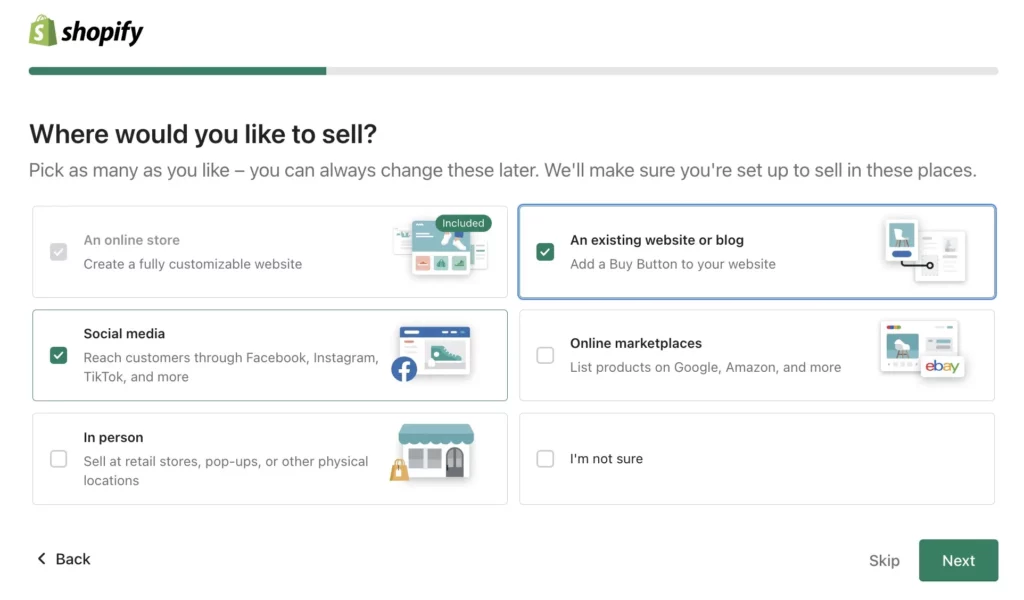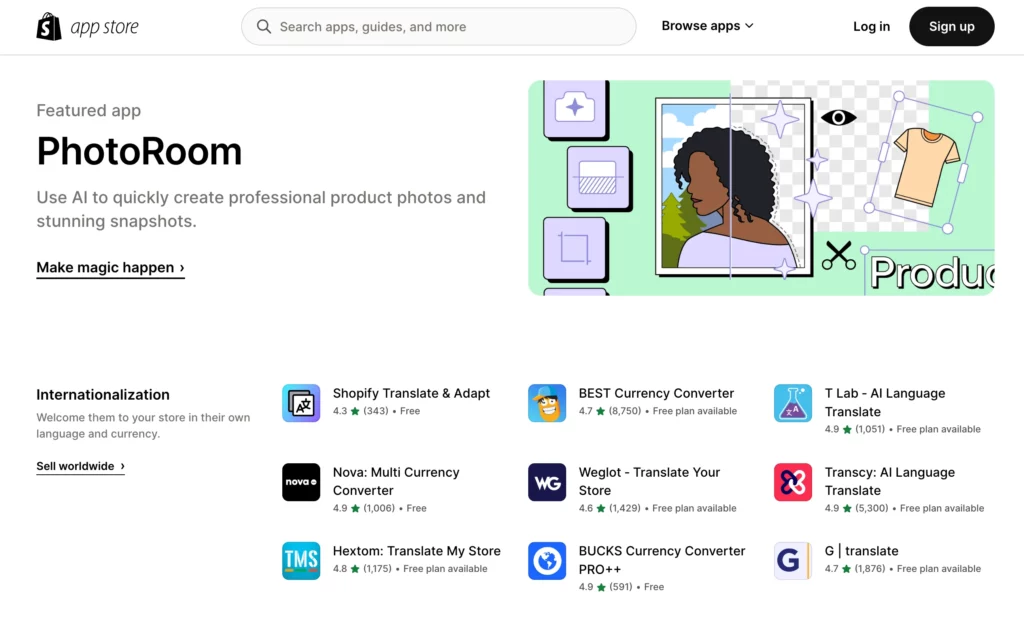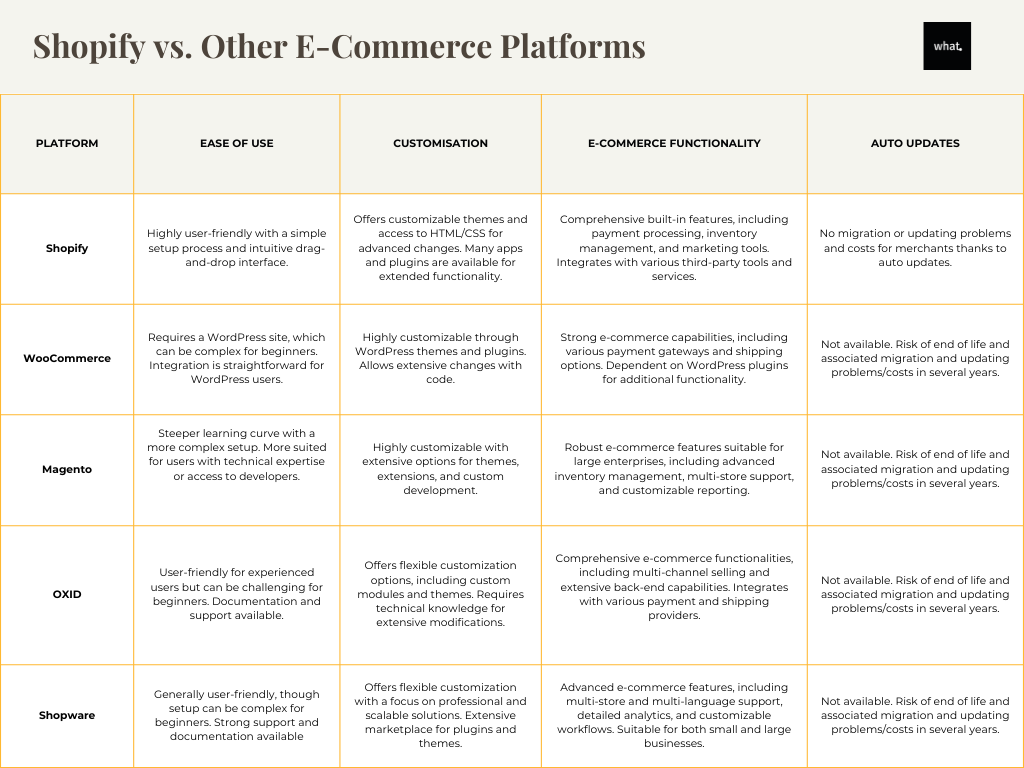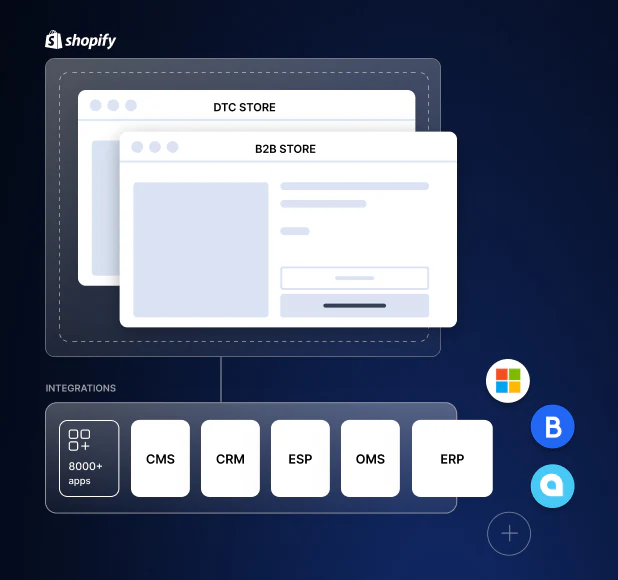

What Does Shopify Do and How Does It Help E-Commerce? 2024 Guide
With over 5.23 million stores and 700 million customers worldwide, Shopify is the leading e-commerce platform for SMEs and corporations alike. It offers a one-stop solution to easily set up and manage your online store and payment services without any coding skills, making the e-commerce market accessible to a wide range of businesses.
Find out everything you need to know to scale your business with Shopify.
What is Shopify?
Shopify is a leading cloud-based e-commerce platform that allows businesses of all sizes to create, manage, and grow their online stores. Its scalability and features make it a preferred choice for merchants looking to establish or expand their online presence.
Founded in 2006 in Ottawa, Canada, by the German native Tobias Lütke, Shopify provides a comprehensive suite of tools to help users build customizable websites, manage inventory, process payments, and analyse sales data.
Shopify also supports omnichannel selling, which enables businesses to sell products through multiple channels, including social media, marketplaces, and physical retail locations.

Shopify is particularly popular among small and medium-sized businesses for its ease of use, pricing plans, and its wide range of third-party integrations. The platform also hosts corporations and market leaders, including Heinz, Red Bull GmbH, Hasbro, Tesla, The Economist, Lindt, Netflix, Staples, and many more.
Shopify in Numbers: Understanding Its Global Influence
Since its inception in 2006, Shopify has become the leading e-commerce platform, offering a wide range of services across multiple countries:
- — 2.1 million daily active users on average
- — 5.23 million online stores
- — Revenue of $3.86 billion in Q1/Q2 2024
- — Over 700 million customers
- — Used by 24% of all e-commerce websites
What Does Shopify Do? A Beginner’s Overview
How does Shopify work? Shopify is a leading e-commerce platform that allows users to create, customise, and manage their online stores with minimal technical knowledge.
The following sections describe the biggest benefits.
User-Friendly Interface and Setup Process
Shopify is accessible to users of all skill levels. Intuitive drag-and-drop templates even allow users with no prior coding knowledge to create attractive, profitable online shops. Besides, it is still flexible enough to meet the customization needs of growing businesses as well as established enterprises.
Customizable Themes and Design Options
Shopify offers a wide range of customizable themes and design options to help businesses create a unique and professional-looking online store. Users can choose from a variety of free and paid themes, each designed to cater to different industries and aesthetics.
These themes are fully customizable and allow you to change colours, fonts, and layouts to match your brand identity without needing any coding skills. This is especially useful to businesses with limited resources, as they can create a visually appealing online shop without the need to hire costly designers and programmers.
For those with more advanced design needs, Shopify also provides access to the underlying HTML and CSS for deeper customisation.
Comprehensive Dashboard for Store Management
The comprehensive dashboard of Shopify facilitates the management of your online store, from adding and organising products to tracking orders and analysing sales data. It offers real-time insights into key metrics, such as sales performance, customer behaviour, and inventory levels. The dashboard also integrates seamlessly with various apps and plugins, so that users can control marketing campaigns and customer support in one place.
Built-In Payment Processing and Security
Shopify Payments enables businesses to accept various payment methods, such as credit and debit cards, Apple Pay, Google Pay, and more, directly on their store without the need for third-party payment processors.
This simplifies the checkout process and reduces the hassle and costs associated with managing multiple payment gateways. Additionally, Shopify integrates with over 100 external payment gateways, offering flexibility to businesses that prefer using other payment solutions.
Integration with Public Apps
Public apps are verified by Shopify and are available to merchants in the Shopify app marketplace, continuously extending the functionality of the Shopify platform and your e-commerce store. These apps are created by third-party providers but need to adhere to the standards set by Shopify as outlined in the checklist of requirements.
Shopify apps allow you to extend the functionality of the platform with worldwide or local ERP, CRM, fulfillment apps, and a wide range of other systems.

Check out these popular examples of public apps:
- — Patchworks: A powerful no-code/low-code platform with everything you need to manage and integrate your Enterprise Resource Planning (ERP) system and Shopify.
- — Reamaze Live Chat Helpdesk CRM: AI chatbots and AI-powered live chats convert shoppers into happy repeat buyers.
- — Shopify Fulfillment Network: This app allows you to connect with Shopify’s trusted logistics partners.
what. offers turnkey interface solutions to public apps to ensure smooth integration with a range of systems.
This includes well-known fulfillment partners in Switzerland as well as ERP systems such as:
- — Swiss Post: The app of the official postal service of Switzerland facilitates label creation, address validation, customs documents, return labels and more.
- — ShipDirect: A scalable fulfillment tool that supports merchants in Switzerland and the EU with sustainable e-commerce services, from warehousing to returns from a single source.
- — Multisped: Facilitate logistics and fulfillment with various parcel service providers or the app’s own forwarding agency to ship nationally and internationally.
- — Texdata: This Shopify app allows you to directly import your Shopify orders into your Texdata ERP system (Diamod).
Seamless Integration with Custom Apps
Besides all the advantages, the drawback of public apps is the lack of customisation, since they offer one-fits-all solutions, which typically meet the needs of most merchants. However, if you need to make some changes, there’s no way to access the codebase.
This is where custom apps come into play.
Even if there isn’t an app in the Shopify store that covers your requirements, there are endless Shopify development solutions. Compared to public apps, custom apps can be specifically designed for your individual Shopify store. These apps can be managed via the merchant’s Shopify admin or in the partner’s dashboard.
To actually make use of custom apps, Shopify offers a wide range of APIs with different functionalities. The costs of hosting your app depend on the computing power needed to run your app. Custom apps require you to closely follow Shopify’s API versioning schedule to keep your apps working if changes occur.
In summary, Shopify offers a wide range of public apps, which suit most users. With the integration of custom apps, Shopify opens the door to full customization of your online shop.
what. creates custom Shopify apps that perfectly fit your purpose. Previous examples include reliable connectors to local Swiss ERPs such as DataForce and Proffix or German ERPs like Brückner.
Shopify vs. Other Platforms: Why Consider It For Building Your Online Store?
In 2024, users can opt for a wide range of different e-commerce platforms to create their online store. Compared to most other platforms, Shopify offers a great experience for beginners, while leaving enough flexibility for custom solutions.

Ease of Migration
No matter which platform you currently use, migration to Shopify is easier and more cost-efficient than ever before. After acquiring eCommercify’s portfolio and assets, what. has become the leading digital marketing agency and Shopify consultancy in Switzerland, so that you can facilitate your migration process and scale your business even further.
Our services include:
- — Growth hacking services
- — Domain connection and launch preparation
- — System configuration that matches your visual identity
- — Theme customisation
- — App and interface integration
- — Special feature integrations
- — ERP integration
- — Shopify administrator training
Support and Community
As a global market leader, users have all the necessary resources needed. While Shopify provides 24/7 customer support through various channels, including live chat, email, and phone, users can further profit from the large Shopify community, as they are able to ask questions, share experiences, and receive advice from other Shopify merchants.
Shopify for Different Business Needs: Is It Right for You?
Shopify caters to a wide range of businesses, from startups to large enterprises, and supports various business models, including B2C and B2B.
Startup Shops: The Ideal Ecommerce Solution for New Businesses
Startups often lack funding and revenue streams. Shopify’s user-friendly interface and affordable pricing model make it ideal for startups. Its intuitive dashboard and drag-and-drop store builder allow easy setup without coding skills, so that business owners don’t need to hire expensive IT personnel.
Mid-Size Businesses: Transitioning to Shopify for Enhanced Performance
Mid-size businesses with existing online stores might switch to Shopify to benefit from its superior scalability and functionality such as built-in analytics and integrated payment processing as well as third-party apps and services. As migration has become relatively easy, more and more SMEs are willing to invest in Shopify’s extensive features.
Large Enterprises: Advanced Features
Large businesses can leverage Shopify Plus to meet advanced needs. Shopify Plus supports ERP integrations for seamless synchronisation with existing business systems and also facilitates multi-channel sales to manage and expand the market presence across various platforms from a single dashboard. Shopify further provides advanced analytics tools that offer deep insights into performance to make data-driven decisions.
B2C and D2C: Engaging Customers Directly with Shopify
Shopify supports B2C and D2C (Direct-to-Consumer) models by offering a suite of tools designed for direct customer engagement.
- Marketing: Shopify integrates seamlessly with platforms like Google, Facebook, and email marketing services to run targeted campaigns and track their effectiveness.
- Checkout process: Shopify simplifies the checkout process with features like Shopify Payments and one-click checkout, which reduces friction and increases conversions.
- Customisation: Shopify allows for personalised shopping experiences through customisable themes, product recommendations, and personalised marketing messages.
B2B: Streamlining Business Transactions on Shopify
Shopify caters to B2B businesses with features designed to streamline transactions and enhance client interactions.
- — Custom pricing: Allows businesses to offer tailored pricing structures for different clients, making transactions more flexible and transparent.
- — Wholesale options: Enable companies to create dedicated storefronts for bulk purchases with special pricing and terms.
- — Management tools: Shopify also integrates with various business management tools, such as ERP and CRM systems to coordinate the data flow between platforms.

Conclusion: Is Shopify the Right Platform for Your Business?
Shopify stands out as a powerful and versatile platform for businesses looking to establish or enhance their online presence. Its user-friendly interface, extensive range of customisable templates, and robust e-commerce tools make it a top choice for entrepreneurs and established brands alike. Shopify’s scalability ensures that it can grow with your business, whether you’re just starting out or expanding into new markets.
Book a free consultation with Switzerland’s leading Shopify consultancy to scale your business today.
